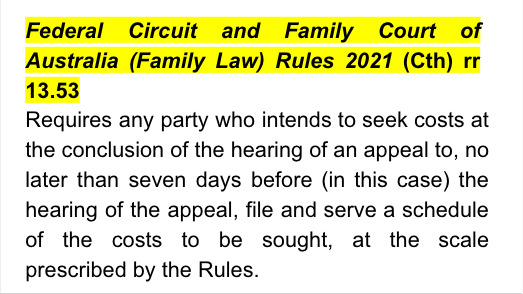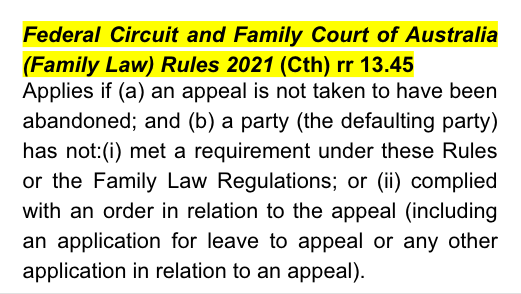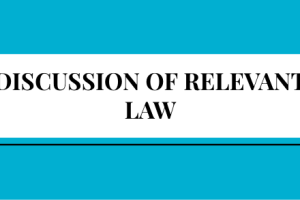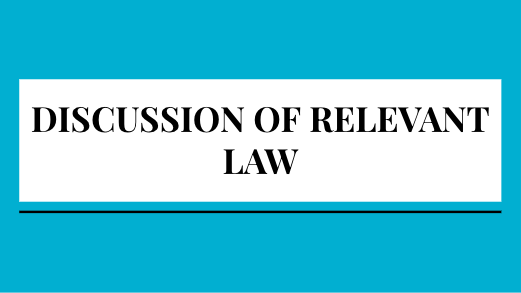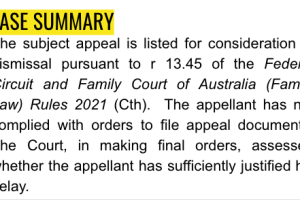- · 4717 friends
When a self-represented litigant who has been delaying proceedings appeals but doesn't know the rules

Brathwell & Brathwell [2022] FedCFamC1A 166 (10 October 2022)
The appeal is listed for consideration of dismissal pursuant to r 13.45 of the Federal Circuit and Family Court of Australia (Family Law) Rules 2021 (Cth). The appellant has not complied with orders to file appeal documents. The Court, in making final orders, assessed whether the appellant has sufficiently justified his delay.

Facts
The proceedings were commenced by the [appellant] on 27 July 2015. The matter progressed in the usual way until 15 February 2018 and on that occasion the [appellant] did not attend. On that occasion Her Honour Judge Cassidy stated that she would put a notation on the orders that if the [appellant] failed to attend on the next occasion, either in person or through a solicitor, or make an application for a litigation guardian the court may make orders in default of his appearance.
On 22 February 2018 the [appellant] once again failed to appear and Judge Cassidy once again listed the matter for default hearing noting that orders might be made in default if the [appellant] father failed to appear.
On 19 April 2018 the [appellant] appeared in person, however, the matter was adjourned as the [appellant] was unprepared to advance the matter and costs were reserved.
On 25 September 2019 the [appellant] was ordered to attend the [respondent’s] solicitor’s offices at a specific time to confer about disclosure and admitted facts and he failed to attend.
On 14 November 2019 trial directions were made providing that a consolidated trial affidavit be filed by 14 February 2020 and a case outline document filed by 10 March 2020. The [appellant] has not filed any document since that time that could be considered a trial affidavit or an outline of case.
The trial was set for 17 March 2020 and on that occasion the [appellant] did not attend although he was represented by Counsel who sought an adjournment on the basis that the [appellant] was unwell. The trial was relisted to commence on 3 August 2021, however, that trial did not proceed.
On 11 April 2022, the first day of trial, the [appellant] once again sought an adjournment as a result of his inability to file documents in accordance with orders of the court. Both the respondent and the independent children’s lawyer submitted that the matter should proceed by way of undefended hearing.
The [appellant] filed an affidavit on 13 November 2019 and on page 81 of that affidavit the [appellant] annexes a letter dated 7 November 2019 from [a doctor] setting out that the [appellant] suffers from mental conditions.
The appellant filed a Notice of Appeal in relation to the parenting orders on 9 May 2022, and a Notice of Appeal in relation to the property orders on 12 May 2022. On 6 July 2022, the matter came before an appeals registrar, on which occasion procedural orders were made readying the appeal for hearing, which was listed for 5 October 2022. Under those orders, the appellant was to file Amended Notices of Appeal (as his original Notices of Appeal did not contain succinct, proper grounds) and Summaries of Argument, both by 5 August 2022. The appellant has failed to comply with those orders and no further documents have been filed by him since the original Notices of Appeal.
At the 5 October 2022 hearing, the appellant proposed that the time limited for the filing of his material be extended to 2 November 2022, with further consequential orders extending the time for subsequent steps in the appeal. He did not oppose an order that the appeals be dismissed if he failed to file his material within the specified time. The course the appellant proposed was opposed by both the respondent and the Independent Children's Lawyer, who sought that the appeals be dismissed instead.

Issue
Whether or not the appellant has sufficiently justified his delay.

Applicable law



Analysis
The explanation proffered by the appellant for his non-compliance with pertinent aspects of the 6 July 2022 orders wavered between him not having received a response to his application for legal aid funding, and that his health issues precluded him from being able to attend to the necessary tasks. Although the judgments were delivered in April 2022, and Notices of Appeal filed in May, the appellant told his Honour he had not applied for legal aid until July. He proffered no explanation for that delay.
There was no explanation of the ensuing apparent delay in processing that application, although in submissions the appellant told me he had only that day received notification that his application had been referred to a senior person at Legal Aid for consideration.
Significantly the likely fate of his application was not disclosed. Whatever health issues may beset the appellant, they did not preclude him from drafting the two Notices of Appeal, the first running to 18 prolix grounds spanning three closely typed pages, and the second containing no less than 27 different, but equally prolix grounds, extending to five closely typed pages. Moreover both documents were able to be prepared and filed within the relevant time limits.
Conclusion
The Appeal NAA 102 of 2022 is dismissed. The respondent's oral application to extend time to file her schedule of costs is refused.



